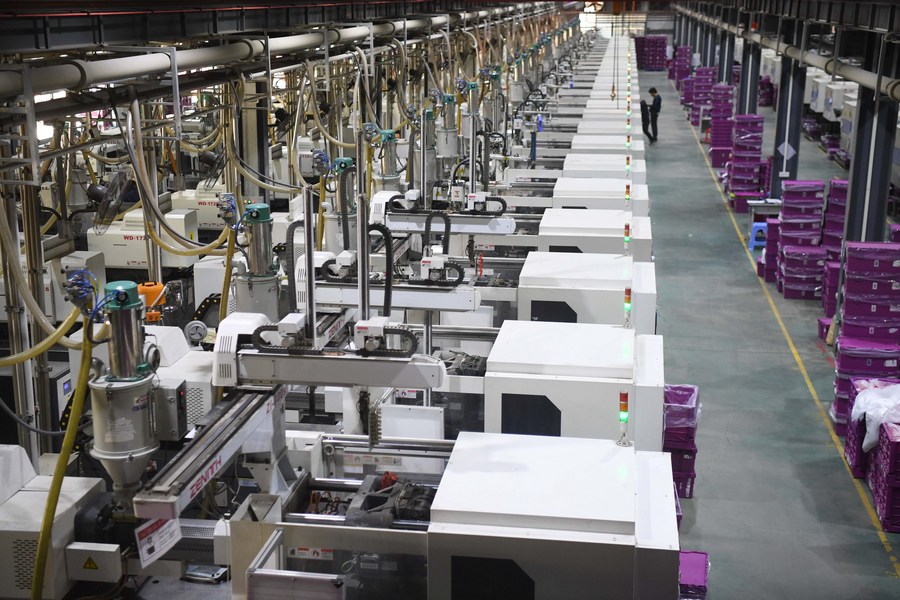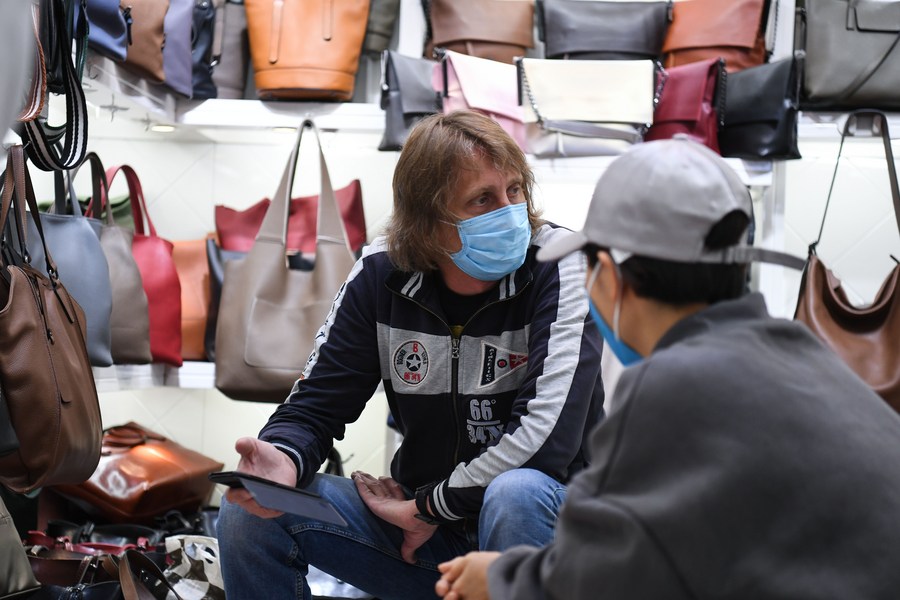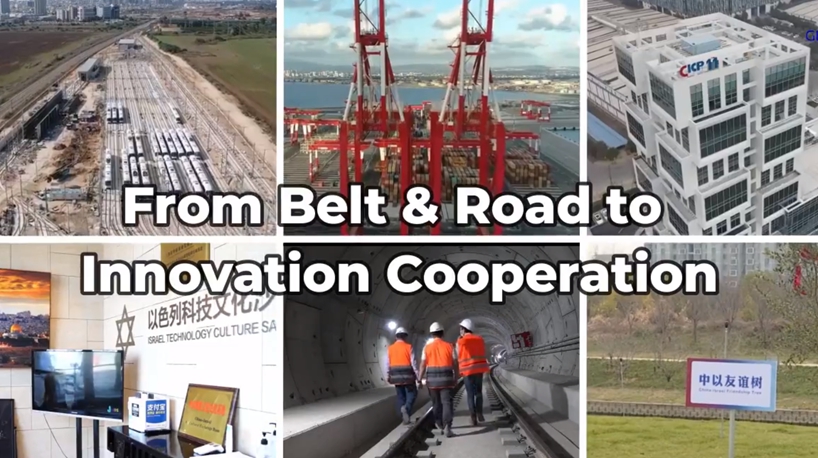GUANGZHOU, Jan. 24 (Xinhua) -- Many of China's small and medium-sized enterprises (SMEs) have been hit hard by the COVID-19 pandemic that is still raging across the globe. Instead of giving in, they have fought a way out of the predicament and are now embracing an even brighter prospect.
Located in the southern Chinese tech hub of Shenzhen, Guangdong Province, Taihua Toys (Shenzhen) Co., Ltd. faced a make-or-break moment in early 2020 as the overseas market is vital for the company.
"Factories stopped running due to the COVID-19 outbreak, and customer orders could not go out as scheduled," said Liu Wenwei, general manager of the toy maker. He could not help crying when he recalled "the darkest hour" of the company.
Workers still got paid, even without working, Liu said. In the meantime, the pandemic situation overseas led to a sharp drop in orders, and it was hard to find a container to transport goods, making it difficult for the prepared products to be shipped abroad.

A factory producing toy bricks is pictured in Shantou City, south China's Guangdong Province, Dec. 2, 2021. (Xinhua/Deng Hua)
Around the Chinese Lunar New Year in 2021, the company's cash flow was about to wither as it faced a pincer attack from both upstream suppliers' capital settlement and workers' wages.
Due to the impact of the COVID-19 pandemic, China's gross domestic product (GDP) shrank 6.8 percent in the first quarter of 2020, according to the National Bureau of Statistics (NBS).
Guangdong has the highest concentration of SMEs in China. By the end of 2020, there were over 5.86 million SMEs in the province, accounting for about one-seventh of the national total. Many of them were facing the same dilemma as Liu's company.
DIGITAL TRANSFORMATION
One hundred kilometers away from Shenzhen, more than 8,000 enterprises specializing in bag and luggage production in the town of Shiling in Guangzhou also reached a crossroad. Shiling is known as the "leather goods capital of China."

A foreign purchaser discusses business with a merchant at a leather goods market in Guangzhou, south China's Guangdong Province, March 5, 2020. (Xinhua/Deng Hua)
Supply chains were severely damaged, sales channels were disrupted, and raw material prices rose sharply due to the fallout of the pandemic.
Against this backdrop, Huang Haifeng, general manager of Guangzhou Longzhuo Leather Co., Ltd., decided to improve the production efficiency of his company.
Huang started exploring digital transformation in early 2021. To prove its feasibility, he organized a man-machine competition in the company.
Huang asked workers with decades of experience to do the same work as newly introduced digital machines. It was not hard to imagine the end of the competition -- 10 master workers produced far less than a single machine in the same time frame.
Huang spent about 800,000 yuan (about 126,161 U.S. dollars) introducing digital machines, and the savings from going digital in one year also amounted to around 800,000 yuan. The investment broke even within a year.
"Our company's production efficiency has increased by 10 percent only half a year after the digital transformation," said Huang.

Photo taken on Nov. 26, 2020 shows a model of a 5G-supported smart factory at a 5G-themed exhibition held during the World 5G Convention in Guangzhou, south China's Guangdong Province. (Xinhua/Deng Hua)
BRIGHT FUTURE
Liu Wenwei also relied on new smart devices to improve production efficiency. With the help of the Shenzhen branch of the Industrial and Commercial Bank of China (ICBC), Liu received a 3-million yuan credit loan in January 2021.
Liu used the loan to purchase intelligent cloth laying machines, intelligent cutting machines, and other equipment, which improved production capacity. The efficiency of a cloth laying machine is equivalent to the work of four workers.
The situation of Taihua Toys has improved a lot. At present, the amount of toys made by the company reaches up to 600,000 per month.
Not long ago, Liu's company won the bid for mascot producing orders for the Beijing Winter Olympics and Paralympics.

Toys are displayed at a toy cultural and tourism industrial park in Chenghai District of Shantou City, south China's Guangdong Province, Dec. 1, 2021. (Xinhua/Deng Hua)
There are more than 40 million SMEs like Taihua Toys in China, and they contribute more than 80 percent of urban employment. The Chinese government has been vigorously supporting these small and medium firms in their efforts to overcome the difficulties.
Inclusive finance is now becoming a strategic choice for China's state-owned banks. "Almost every month, we are launching one or two innovative products that meet the financing needs of different types of enterprises," said Yang Fan, vice president of ICBC Shenzhen branch.
"Overseas orders are coming back," said Liu of Taihua Toys. "Old friends from overseas trust Chinese enterprises. They trust our product quality, intelligent production equipment, production capacity, and cost performance," he added.
China continued to lead the world in economic recovery and epidemic control in 2021, with GDP expanding 8.1 percent year on year to 114.37 trillion yuan, according to the NBS.
"Enterprises that survive the crisis will have stronger risk resistance and competitiveness in the future," said Chen Zhuming, a professor at Guangzhou-based Sun Yat-sen University. (Video reporters: Wang Haoming, Yin Peng, Li Sijia; video editors: Zheng Xin, Cao Ying) ■












